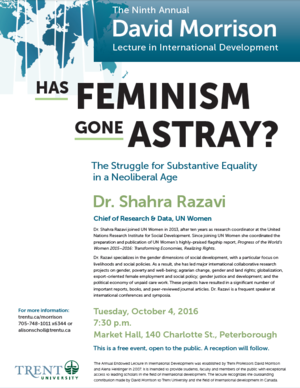
Dr. Shahra Razavi
Chief of Research & Data, UN Women
October 4, 2016
Dr. Shahra Razavi joined UN Women in 2013, after ten years as research coordinator at the United Nations Research Institute for Social Development. Since joining UN Women she coordinated the preparation and publication of UN Women’s highly-praised flagship report, Progress of the World’s Women 2015–2016: Transforming Economies, Realizing Rights.
Dr. Razavi specializes in the gender dimensions of social development, with a particular focus on livelihoods and social policies. As a result, she has led major international collaborative research projects on gender, poverty and well-being; agrarian change, gender and land rights; globalization, export oriented female employment and social policy; gender justice and development; and the political economy of unpaid care work. These projects have resulted in a significant number of important reports, books, and peer reviewed journal articles. Dr. Razavi is a frequent speaker at international conferences and symposia.
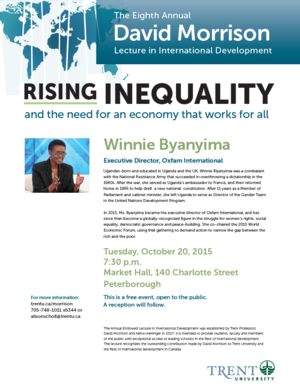
WINNIE BYANYIMA
Executive Director, Oxfam International
October 20, 2015
Ugandan-born and educated in Uganda and the UK, Winnie Biyanyima was a combatant with the National Resistance Army that succeeded in overthrowing a dictatorship in the 1980s. After the war, she served as Uganda’s ambassador to France, and then returned home in 1995 to help draft a new national constitution. After 11 years as a Member of Parliament and cabinet minister, she left Uganda to serve as Director of the Gender Team in the United Nations Development Program. In 2013, Ms. Byanyima became the executive director of Oxfam International, and has since then become a globally-recognized figure in the struggle for women’s rights, social equality, democratic governance and peace-building. She co-chaired the 2015 World Economic Forum, using that gathering to demand action to narrow the gap between the rich and the poor.
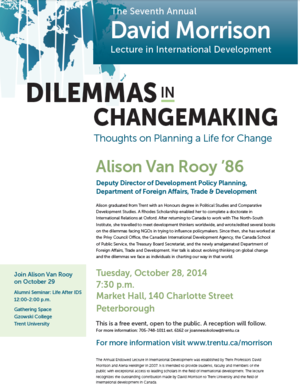
Ms Van Rooy '86
Deputy Director of Development Policy Planning, Department of Foreign Affairs, Trade & Development
October 28, 2014
Alison graduated from Trent with an Honours degree in Political Studies and Comparative Development Studies. A Rhodes Scholarship enabled her to complete a doctorate in International Relations at Oxford. After returning to Canada to work with The North-South Institute, she travelled to meet development thinkers worldwide, and wrote/edited several books on the dilemmas facing NGOs in trying to influence policymakers. Since then, she has worked at the Privy Council Office, the Canadian International Development Agency, the Canada School of Public Service, the Treasury Board Secretariat, and the newly amalgamated Department of Foreign Affairs, Trade and Development. Her talk examined the evolution in thinking on global change and the dilemmas we face as individuals in charting our way in that world.
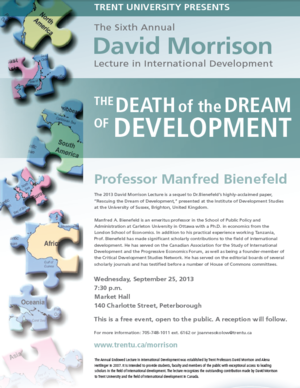
Professor Manfred Bienefeld
Professor, School of Public Policy, Administration at Carleton University
September 25, 2013
Manfred A. Bienefeld is an emeritus professor in the School of Public Policy and Administration at Carleton University in Ottawa with a Ph.D. in economics from the London School of Economics. In addition to his practical experience working Tanzania, Prof. Bienefeld has made significant scholarly contributions to the field of international development. He has served on the Canadian Association for the Study of International Development and the Progressive Economics Forum, as well as being a founder-member of the Critical Development Studies Network. He has served on the editorial boards of several scholarly journals and has testified before a number of House of Commons committees.
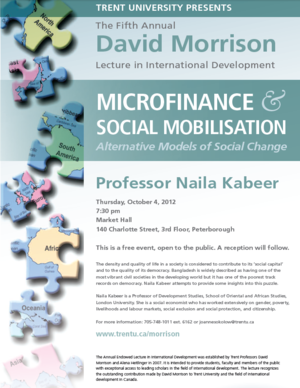
Professor Naila Kabeer
Professor, Development Studies, School of Oriental and African Studies, London University
October 4, 2012
The density and quality of life in a society is considered to contribute to its ‘social capital’ and to the quality of its democracy. Bangladesh is widely described as having one of the most vibrant civil societies in the developing world but it has one of the poorest track records on democracy. Naila Kabeer attempts to provide some insights into this puzzle. Naila Kabeer is a professor of Development Studies, School of Oriental and African Studies, London University. She is a social economist who has worked extensively on gender, poverty, livelihoods and labour markets, social exclusion and social protection, and citizenship.
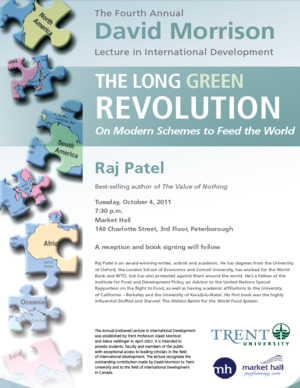
RAJ PATEL
Best selling author of The Value of Nothing
October 4, 2011
Raj Patel is an award-winning writer, activist and academic. He has degrees from the University of Oxford, the London School of Economics and Cornell University, has worked for the World Bank and WTO, but has also protested against them around the world. He’s a fellow at the Institute for Food and Development Policy, an Advisor to the United Nations Special Rapporteur on the Right to Food, as well as having academic affiliations to the University of California – Berkeley and the University of KwaZulu-Natal. His first book was the highly influential Stuffed and Starved: The Hidden Battle for the World Food System.
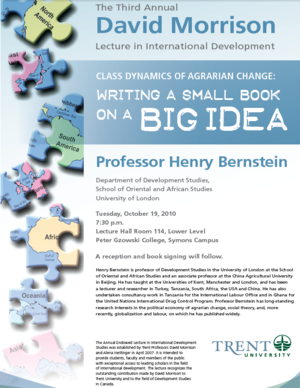
PROFESSOR HENRY BERNSTEIN
Professor, Department of Development Studies, School of Oriental and African Studies University of London
October 19, 2010
Henry Bernstein is professor of Development Studies in the University of London at the School of Oriental and African Studies and an associate professor at the China Agricultural University in Beijing. He has taught at the Universities of Kent, Manchester and London, and has been a lecturer and researcher in Turkey, Tanzania, South Africa, the USA and China. He has also undertaken consultancy work in Tanzania for the International Labour Office and in Ghana for the United Nations International Drug Control Program. prof Bernstein has long-standing research interests in the political economy of agrarian change, social theory, and, more recently, globalization and labour, on which he has published widely.
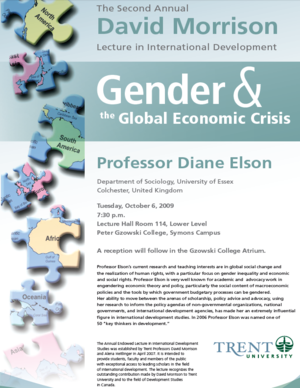
PROFESSOR DIANE ELSON
Professor, Department of Sociology, University of Essex Colchester, United Kingdom
October 6, 2009
Professor Elson’s current research and teaching interests are in global social change and the realization of human rights, with a particular focus on gender inequality and economic and social rights. Prof Elson is very well known for academic and advocacy work in engendering economic theory and policy, particularly the social content of macroeconomic policies and the tools by which government budgetary processes can be gendered. Her ability to move between the arenas of scholarship, policy advice and advocacy, using her research to inform the policy agendas of non-governmental organizations, national governments, and international development agencies, has made her an extremely influential figure in international development studies. In 2006, Prof Elson was named one of 50 “key thinkers in development.”
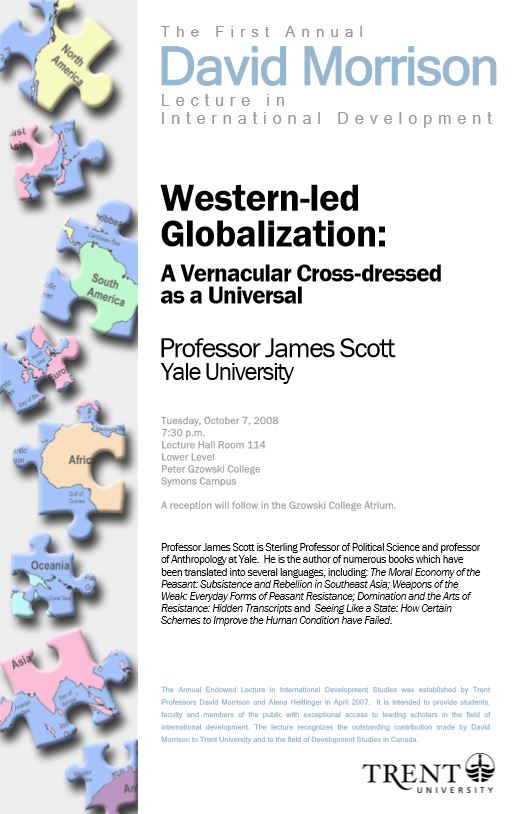
PROFESSOR James scott
Professor, Yale University
October 7, 2008
Professor James Scott is Sterling Professor of Political Science and professor of Anthropology at Yale. He is the author of numerous books which have been translated into several languages, including: The Moral Economy of the Peasant: Subsistence and Rebellion in Southeast Asia; Weapons of the Weak: Everyday Forms of Peasant Resistance; Domination and the Arts of Resistance: Hidden Transcripts and Seeing Like a State: How Certain Schemes to Improve the Human Condition have Failed.
|